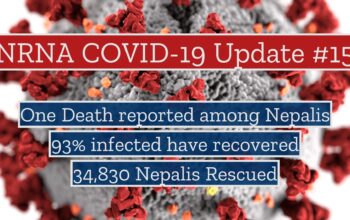President Trump on Monday signed an executive order, which is the continuation to his previous proclamation 10014, to suspend the issuance of certain temporary worker visas in H, J, and L categories until the end of 2020. The White House noted the suspension of non-US workers to “a Risk to the U.S. Labor Market Following the Coronavirus Outbreak” in its Proclamation.
Highlights of Trump’s Visa Ban
- Executive Order “shall expire on December 31, 2020, and may be continued as necessary. ”
- Executive Order is effective at 12:01 a.m. eastern daylight time on June 24, 2020.
- Suspension and Limitation on Entry of H-1B Visa or H-2B visa, J visa, and L visa,
- Shall apply to those;
- who are outside the United States;
- who does not have a valid non-immigrant visa; and
- who does not have an official travel document other than visa
- Shall not apply to those;
- who are lawful permanent resident of the United States;
- who are the spouse or child of a United States citizen;
- who seek to enter the United States to provide temporary labor or services essential to the United States food supply chain; and
- whose entry would be in the national interest
on the effective day of the proclamation.
- Shall apply to those;
Section 1. Continuation of Proclamation 10014.
(a) Section 4 of Proclamation 10014 is amended to read as follows:
“Sec. 4. Termination. This proclamation shall expire on December 31, 2020, and may be continued as necessary. Within 30 days of June 24, 2020, and every 60 days thereafter while this proclamation is in effect, the Secretary of Homeland Security shall, in consultation with the Secretary of State and the Secretary of Labor, recommend any modifications as may be necessary.”
(b) This section shall be effective immediately.
Sec. 2. Suspension and Limitation on Entry.
The entry into the United States of any alien seeking entry pursuant to any of the following nonimmigrant visas is hereby suspended and limited, subject to section 3 of this proclamation:
(a) an H-1B or H-2B visa, and any alien accompanying or following to join such alien;
(b) a J visa, to the extent the alien is participating in an intern, trainee, teacher, camp counselor, au pair, or summer work travel program, and any alien accompanying or following to join such alien; and
(c) an L visa, and any alien accompanying or following to join such alien.
Sec. 3. Scope of Suspension and Limitation on Entry.
(a) The suspension and limitation on entry pursuant to section 2 of this proclamation shall apply only to any alien who:
(i) is outside the United States on the effective date of this proclamation;
(ii) does not have a nonimmigrant visa that is valid on the effective date of this proclamation; and
(iii) does not have an official travel document other than a visa (such as a transportation letter, an appropriate boarding foil, or an advance parole document) that is valid on the effective date of this proclamation or issued on any date thereafter that permits him or her to travel to the United States and seek entry or admission.
(b) The suspension and limitation on entry pursuant to section 2 of this proclamation shall not apply to:
(i) any lawful permanent resident of the United States;
(ii) any alien who is the spouse or child, as defined in section 101(b)(1) of the INA (8 U.S.C. 1101(b)(1)), of a United States citizen;
(iii) any alien seeking to enter the United States to provide temporary labor or services essential to the United States food supply chain; and
(iv) any alien whose entry would be in the national interest as determined by the Secretary of State, the Secretary of Homeland Security, or their respective designees.
Sec. 4. Implementation and Enforcement.
(a) The consular officer shall determine, in his or her discretion, whether a nonimmigrant has established his or her eligibility for an exception in section 3(b) of this proclamation. The Secretary of State shall implement this proclamation as it applies to visas pursuant to such procedures as the Secretary of State, in consultation with the Secretary of Homeland Security and the Secretary of Labor, may establish in the Secretary of State’s discretion. The Secretary of Homeland Security shall implement this proclamation as it applies to the entry of aliens pursuant to such procedures as the Secretary of Homeland Security, in consultation with the Secretary of State, may establish in the Secretary of Homeland Security’s discretion.
(i) The Secretary of State, the Secretary of Labor, and the Secretary of Homeland Security shall establish standards to define categories of aliens covered by section 3(b)(iv) of this proclamation, including those that: are critical to the defense, law enforcement, diplomacy, or national security of the United States; are involved with the provision of medical care to individuals who have contracted COVID-19 and are currently hospitalized; are involved with the provision of medical research at United States facilities to help the United States combat COVID-19; or are necessary to facilitate the immediate and continued economic recovery of the United States. The Secretary of State and the Secretary of Homeland Security shall exercise the authority under section 3(b)(iv) of this proclamation and section 2(b)(iv) of Proclamation 10014 to exempt alien children who would as a result of the suspension in section 2 of this proclamation or the suspension in section 1 of Proclamation 10014 age out of eligibility for a visa.
(ii) Aliens covered by section 3(b)(iv) of this proclamation, under the standards established in section 4(a)(i) of this proclamation, shall be identified by the Secretary of State, the Secretary of Homeland Security, or their respective designees, in his or her sole discretion.
(b) An alien who circumvents the application of this proclamation through fraud, willful misrepresentation of a material fact, or illegal entry shall be a priority for removal by the Department of Homeland Security.
(c) Nothing in this proclamation shall be construed to limit the ability of an individual to seek asylum, refugee status, withholding of removal, or protection under the Convention Against Torture and Other Cruel, Inhuman or Degrading Treatment or Punishment, consistent with the laws of the United States.
Sec. 5. Additional Measures.
(a) The Secretary of Health and Human Services, through the Director of the Centers for Disease Control and Prevention, shall, as necessary, provide guidance to the Secretary of State and the Secretary of Homeland Security for implementing measures that could reduce the risk that aliens seeking admission or entry to the United States may introduce, transmit, or spread SARS-CoV-2 within the United States.
(b) The Secretary of Labor shall, in consultation with the Secretary of Homeland Security, as soon as practicable, and consistent with applicable law, consider promulgating regulations or take other appropriate action to ensure that the presence in the United States of aliens who have been admitted or otherwise provided a benefit, or who are seeking admission or a benefit, pursuant to an EB-2 or EB-3 immigrant visa or an H-1B nonimmigrant visa does not disadvantage United States workers in violation of section 212(a)(5)(A) or (n)(1) of the INA (8 U.S.C. 1182(a)(5)(A) or (n)(1)). The Secretary of Labor shall also undertake, as appropriate, investigations pursuant to section 212(n)(2)(G)(i) of the INA (8 U.S.C. 1182(n)(2)(G)(i)).
(c) The Secretary of Homeland Security shall:
(i) take appropriate action, consistent with applicable law, in coordination with the Secretary of State, to provide that an alien should not be eligible to apply for a visa or for admission or entry into the United States or other benefit until such alien has been registered with biographical and biometric information, including but not limited to photographs, signatures, and fingerprints;
(ii) take appropriate and necessary steps, consistent with applicable law, to prevent certain aliens who have final orders of removal; who are inadmissible or deportable from the United States; or who have been arrested for, charged with, or convicted of a criminal offense in the United States, from obtaining eligibility to work in the United States; and
(iii) as soon as practicable, and consistent with applicable law, consider promulgating regulations or take other appropriate action regarding the efficient allocation of visas pursuant to section 214(g)(3) of the INA (8 U.S.C. 1184(g)(3)) and ensuring that the presence in the United States of H-1B nonimmigrants does not disadvantage United States workers.
Sec. 6. Termination.
This proclamation shall expire on December 31, 2020, and may be continued as necessary. Within 30 days of the effective date of this proclamation and every 60 days thereafter while this proclamation is in effect, the Secretary of Homeland Security shall, in consultation with the Secretary of State and the Secretary of Labor, recommend any modifications as may be necessary.
Sec. 7. Effective Date.
Except as provided in section 1 of this proclamation, this proclamation is effective at 12:01 a.m. eastern daylight time on June 24, 2020.
Sec. 8. Severability.
It is the policy of the United States to enforce this proclamation to the maximum extent possible to advance the interests of the United States. Accordingly:
(a) if any provision of this proclamation, or the application of any provision to any person or circumstance, is held to be invalid, the remainder of this proclamation and the application of its provisions to any other persons or circumstances shall not be affected thereby; and
(b) if any provision of this proclamation, or the application of any provision to any person or circumstance, is held to be invalid because of the lack of certain procedural requirements, the relevant executive branch officials shall implement those procedural requirements to conform with existing law and with any applicable court orders.
Sec. 9. General Provisions.
(a) Nothing in this proclamation shall be construed to impair or otherwise affect:
(i) the authority granted by law to an executive department or agency, or the head thereof; or
(ii) the functions of the Director of the Office of Management and Budget relating to budgetary, administrative, or legislative proposals.
(b) This proclamation shall be implemented consistent with applicable law and subject to the availability of appropriations.
(c) This proclamation is not intended to, and does not, create any right or benefit, substantive or procedural, enforceable at law or in equity by any party against the United States, its departments, agencies, or entities, its officers, employees, or agents, or any other person.


